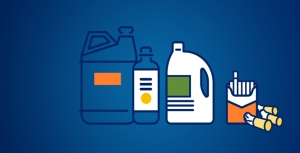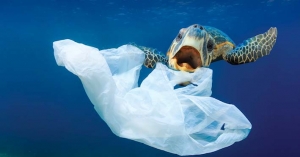Displaying items by tag: plastic bags
Some progress on legislation to reduce plastic waste
In June 2021 NSW introduced a Plastics Action Plan. The most visible action is the plan to reduce harmful plastic in the environment. Bans on single use plastics are being introduced but phased in over a longer period compared to many other states.
From 1 June single use lightweight plastic bags are banned. Then from November other single use items are banned such as straws, stirrers, cutlery, plates and bowls, cotton bud sticks and polystyrene trays.
So-called compostable plastic will also be banned. They don't biodegrade unless they're treated in an industrial composting facility. Often, they break down into useless little pieces.
South Australia has led the way in most categories of single-use plastic bans, followed closely by Queensland and the ACT, and now other states are making ground – especially Western Australia, where regulations ban the heavyweight (commonly 15 cent) plastic supermarket bags and helium balloon releases are banned. Queensland was the first to ban polystyrene food ware and plates, cups and bowls (if not enclosed with a lid) and ACT will be the first to ban plastic-stemmed cotton buds (from July 2022).
At this stage it looks like the only thing where NSW may blaze a trail is banning those annoying plastic fruit stickers – if South Australia doesn’t get there first. They are thinking about it!
Another major item is takeaway coffee cups. Only WA is considering a ban at this stage.
NSW is also providing funding for research into improving the recyclability or re-usability of plastic products.
The biggest source of litter – cigarette butts
Despite the significant progress made in reducing smoking in Australia, nearly 18 billion cigarettes are smoked per year and up to half end up as litter. Cigarette butts can end up in our waterways and oceans and leach toxic materials. Butts have been found in the stomachs of birds, turtles, whales and fish, affecting their digestion and potentially leading to poisoning or starvation.
Current efforts to minimise cigarette pollution in Australia have largely focused on solutions directed at the individual smoker, such as disposal infrastructure and education. Continuing this approach would see little or no reduction in butt litter, according to a report commissioned by WWF.
The report says a levy of $0.004 (less than half a cent) per cigarette could raise $71 million per year to fund the product stewardship scheme. Alternatively, tobacco companies could be required to directly fund the scheme. It could boost collection, recovery and reprocessing of cigarette butts, support research and development to potentially ‘design out’ plastic filters, and improve public awareness of the impacts of cigarette pollution. Most people are unaware that butts contain plastic.
The NSW government will investigate a new extended producer responsibility scheme that will make tobacco companies take responsibility for the litter impacts of their products. For example, they may set mandatory litter reduction targets that those companies must meet through a range of approved activities. This work will align with the Australian government’s recently announced taskforce on cigarette butt litter.
Senate Committee Recommends a Ban on Plastic Bags – Can this Happen?
Good news, a container deposit scheme is going to happen. The NSW Premier announced on 8 May that a scheme based on the Boomerang Alliance’s proposal would be introduced on 1 July 2017. Mike Baird claimed this would be a world-class scheme. The ACT will use the same scheme and Queensland could be on board as well.
This decision will be a major step in reducing the volume of plastic pollution that ends up in our waterways and oceans. The other major source is single use plastic bags. We wrote about this issue in STEP Matters Issue 182.
The Australian government is aware of the problem. On 18 June 2015 the Senate referred the following matter for inquiry and report by April 2016 by the Standing Committee on Environment and Communications.
The threat of marine plastic pollution in Australia and Australian waters, with particular reference to:
- the review of current research and scientific understanding of plastic pollution in the marine environment
- sources of marine plastic pollution
- the impacts of marine plastic pollution, including impacts on species and ecosystems, fisheries, small business, and human health
- measures and resourcing for mitigation
In their report the committee noted that, while there may be the lack of rigor of some of the estimates of the amount of plastic in the marine environment (after all it can only be calculated using some sort of sampling process) they are still sobering: five trillion plastic pieces on the surface of the oceans; eight million tonnes of plastics leaking into the ocean every day – that is the equivalent of one garbage truck of plastic every minute of every day of the year.
Not only is this volume of plastic a significant threat to the health of marine life. The committee was considerably alarmed to hear that the potential effect on human health from the ingestion of microplastics in the food chain is only now emerging as an area of research interest. The committee is concerned that there may be a looming health crisis associated with seafood consumption, and urges the prioritisation of research on this issue, and appropriate investment from both government and industry. The committee also considers that microplastics warrant specific focus in strategies aimed a mitigating the effects of marine plastic.
The report called for state and territory bans on plastic bags, an immediate ban on microbeads and the introduction of container deposit schemes across the country by 2020.
There are still many unnecessary waste issues to be addressed such as the so-called flushable wipes that clog up sewerage systems and take away coffee cups. Most of these changes require a change of mindset. The environment needs to be given more priority than convenience.
Will there be a Ban on Plastic Bags?
The issue of waste and litter from single use plastic bags handed out by supermarkets and other stores has been discussed for many years. For example a detailed research paper was produced by the NSW Parliamentary Library Research Service back in May 2004. This paper recommended that these plastic bags be phased out within five years.


